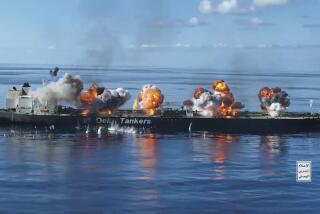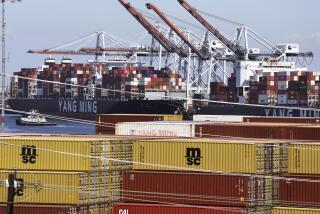IMPACT OF THE GULF WAR : Oil Tankers Ply Gulf Despite Insurance Costs
- Share via
SAN FRANCISCO — Skyrocketing war-risk insurance premiums--rather than the war itself--slowed tanker traffic in the Persian Gulf on Thursday but did not stop it, confirming predictions that hostilities would not significantly impede the flow of oil.
Exxon Corp., for example, had two vessels in the gulf on Thursday, although spokesman Bill Smith declined to say exactly where because of concerns for the security of the ships and their crews.
“Iran and the United Arab Emirates are still loading oil,” said a top official of a big U.S.-based tanker operator. “So is (the big Saudi Arabian port of) Ras Tanura, at least for the time being.”
The official added, however, that some ship charterers are sitting out the first few days of the conflict because oil is in plentiful supply outside of the gulf and war-risk insurance premiums for vessels entering the northern gulf are “horrendous.”
Although premiums had been rising steadily as the Jan. 15 deadline approached, the outbreak of war pushed them up even further.
“For Ras Tanura, premiums are above 5% (of insured value) per voyage. Iran, a noncombatant, is almost 4%. We’re looking at $5 million to insure hull and contents for a single voyage,” he said. In peacetime, such premiums average around $25,000 for an entire year.
“There is no stoppage to shipping,” added John Prescott, shipping correspondent for a Lloyd’s of London publication. With U.S.-led air forces dominating the skies, “the risk to shipping in the first phase of the war has not been particularly great,” Prescott added.
Prescott said the biggest threat to gulf shipping is from floating mines.
The outbreak of fighting in the gulf resulted in a burst of activity for war-risk underwriters in London on Thursday. But although some new policies were being written, most of the war-related work centered on updating the status of existing policies, industry sources said.
The dozen or so Lloyd’s underwriters who specialize in war-risk policies found themselves inundated with brokers seeking assurances that the vessels and cargoes they represented would be adequately covered.
Policy terms vary greatly, with some containing clauses that automatically cancel coverage at the start of hostilities. In response to the increased insurance activity, Lloyd’s for the first time will remain open this weekend.
Meanwhile, the Federal Maritime Administration said it will act as a war-risk insurer of last resort for ships that are considered “essential to the economic support of the United States during a period of declared war or national emergency.” The Federal Aviation Administration is also considering whether to offer such coverage to U.S. commercial airlines serving the region.
The first indication of the brewing insurance crisis came two weeks ago when Pan Am suspended service into Tel Aviv and Riyadh.
Correspondent Jeffrey Kaye in London contributed to this report.
More to Read
Sign up for Essential California
The most important California stories and recommendations in your inbox every morning.
You may occasionally receive promotional content from the Los Angeles Times.










